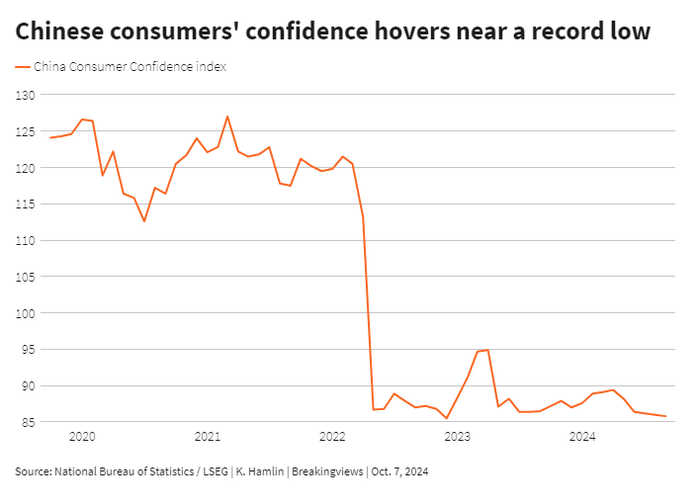Published 12:38 IST, October 7th 2024
China’s consumers regain some lost lustre
On the very first day of China's week-long holiday celebrating the founding of the People's Republic, trips abroad rose 40% from last year.
- Economy
- 3 min read

Reaching for gold. Investors panning for consumption bright spots in the world's second-largest economy will find a bit of good news from this year's Golden Week. Average daily cross-border travel is forecast to rise 19% from last year, above pre-Covid volumes, per official estimates. Gamblers have also returned to Macau. More middle-class spending will stir hopes that Beijing's stimulus might gain traction.
Wealthier travellers were definitely on the move. On the very first day of China's week-long holiday celebrating the founding of the People's Republic, trips abroad rose 40% from last year, HSBC research noted. Long-haul flights topped pre-pandemic levels, online travel agency Trip.com's advanced bookings showed, including a 30% spike in European travel. International travellers spent 120% more using accounts enabled through an international card, according to mobile-wallet service Alipay
Meanwhile, in Macau the numbers of visitors from the mainland rose 6% from 2019 levels during the first three days of the break, per CLSA. Total wagers in the so-called premium mass segment - the higher-end of the mass market - hit a record high even though bets per person were slightly down, according to a Citi survey, thanks to the overall volume of guests.
These early trends indicate China's middle class may be more willing to loosen their purse strings than previously thought. Amid slowing growth and a property downturn, domestic demand has remained anaemic for much of the year: retail sales rose only 2.1% in August, missing analyst forecasts of 2.5%. Indeed, in Hong Kong, once a popular destination for mainland shoppers, the city's Retail Management Association said the number of visitors from across the border during Golden Week was “like a normal weekend”. The mainland box office, another closely-watched indicator during the holiday, was slower than last year, with ticket sales hitting the 1 billion yuan ($143 million) mark a day later than in 2023.
The mixed data suggests that consumption may be perking up in certain pockets of the population. Spending habits are also changing, as travellers eschew splurging on material goods in favour of experiences, Alipay suggested.
Still, Beijing will be grateful for even a partial revival. Right before the holidays, officials unveiled a sweeping package of monetary and property easing measures, and signalled more to come. Hopes of a significant fiscal spending have fuelled a 25% rally in Hong Kong's benchmark index. Signs that China's consumers are regaining some confidence will help add to the momentum.

Context News
Outbound travel rose around 40% year-on-year on Oct. 1, the first day of a week-long public holiday to mark China’s National Day, according to online bookings agency Trip.com data cited in an HSBC research note. The number of visitors coming to Macau on Oct. 1 to Oct. 3 was 478,713, 5% higher than in 2019, and more than a fifth above last year’s levels, according a note from CLSA on Oct. 4. The number of mainland visitors was up 6% over the same period. China reported a record number of trips on its railway network on Oct. 1, the first day of the holidays, Bloomberg reported on Oct. 2. Long-haul flights were set to increase compared to pre-pandemic levels in 2019, Trip.com said on Sept. 25, citing their advanced bookings.
Updated 12:38 IST, October 7th 2024